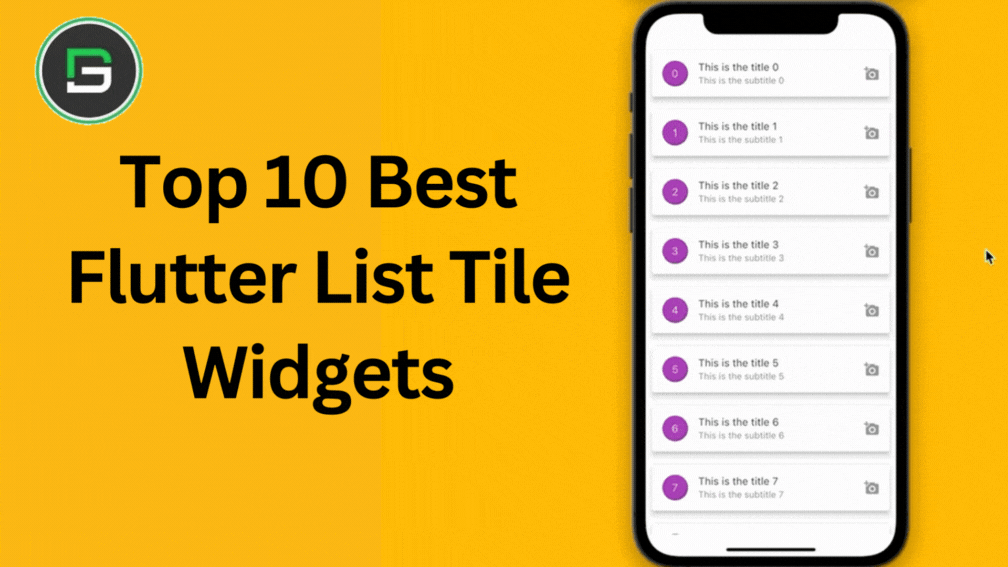Top 10 Best Flutter List Tile Widgets

A Flutter ListTile Wideget contains title, subtitle, or description along with some prefix and suffix icon widget such as checkbox, radio button, images, avatar, etc. The prefix and suffix icons or any other widgets are defined through the leading and trailing parameters.
By default, Flutter ListTile can show two lines of text. The title and the subtitle. As the first line of text is not optional but the second line of text or the subtitle i.e. optional. The texture of the leading and trailing widgets can be modified according to the properties given.
Let's connect and build your idea into a real-time app with UI Library. Now you could start with our documentation from how to get the start and go with each widget.
As of now, we are going to list the top Flutter ListTile Widget packages here:
1. flutter_expanded_tile: ^0.3.6
Short Intro: An expansion tile look alike of listtile which supports android, iOS and web as well.
Check out installation and/or implementation guide on pub.dev:

Contribute or raise an issue ticket on GitHub:
2. list_tile_more_customizable: ^2.0.1
Short Intro: A ListTile with more customizable details, which provides more customizable functions, based on the traditional flutter ListTile.
Check out installation and/or implementation guide on pub.dev:

Contribute or raise an issue ticket on GitHub:
3. list_tile_switch: ^1.0.0
Short Intro: ListTileSwitch is a simple widget that combines ListTile with a switch. Offering 3 types of switch widgets:
i) Switch: Material Switch from Material library on Flutter SDK.
ii) CupertinoSwitch: CupertinoSwitch from Cupertino library on Flutter SDK.
iii) A custom switch.
Check out installation and/or implementation guide on pub.dev:

Contribute or raise an issue ticket on GitHub:
4. dismissible_expanded_list: ^0.3.1
Short Intro: A Flutter plugin to display hierarchical data in the form of list and also allows to swipe the individual tiles.
Also Read: Flutter Notification Badge Widget
Check out installation and/or implementation guide on pub.dev:

Contribute or raise an issue ticket on GitHub:
5. timeline_tile: ^2.0.0
Short Intro: This is a customizable ListTile for timeline creation with flutter.
Check out installation and/or implementation guide on pub.dev:

Contribute or raise an issue ticket on GitHub:
6. getwidget: ^2.0.4
Short Intro: GetWidget is an open source library that comes with pre-build 1000+ UI components. It makes development faster & more enjoyable. You can customize the component as per your need.
Check out installation and/or implementation guide on pub.dev:

Check out the different types and/or implementation of GFListTile:

Contribute or raise an issue ticket on GitHub:
A. Brief overview of Flutter List Tile Widgets:
Flutter provides a variety of List Tile widgets that can be used to represent users or entities in your app. These widgets allow you to display profile pictures, icons, or any custom image as avatars. Here are some commonly used avatar widgets in Flutter:
Also Read: Flutter Bottom Sheet Widget
CircleAvatar:
This widget creates a circular avatar with an optional background color or image. It is often used to display user profile pictures.
ClipOval:
This widget clips its child into an oval shape, making it suitable for creating avatars with non-circular images.
ClipRRect:
This widget clips its child into a rounded rectangle shape. It can be used to create avatars with rounded corners.
FlutterLogo:
This widget displays the official Flutter logo as an avatar. It's useful for indicating that a section of your app is related to Flutter.
ListTile:
Although not specifically an avatar widget, ListTile often includes an avatar as part of its layout. It is commonly used to represent a list item with an accompanying image or icon.
These widgets can be customized with various properties such as size, shape, image source, background color, and more. They provide a flexible way to display avatars in your Flutter app, allowing you to create visually appealing user interfaces.
B. Importance of Avatar Widgets in Flutter app development:
Avatar widgets play a significant role in Flutter app development for the following reasons:
User Identification:
Avatars are commonly used to represent users in social networking, messaging, and other user-centric apps. By displaying user avatars, you can provide a visual identification that helps users recognize and differentiate between different individuals.
Personalization:
Avatars allow users to personalize their profiles and express their identity within an app. By providing options for users to upload or select their own avatars, you can enhance the user experience and make the app feel more engaging and personalized.
Visual Hierarchy:
Avatars can be used to emphasize certain elements or actions within your app. For example, you might use a larger avatar to highlight the primary user or use avatars with different styles to represent various user roles or categories.
Branding:
Avatars can be used to display logos, icons, or brand images within an app. This is particularly useful when building apps for organizations, where avatar widgets can help reinforce brand identity and recognition.
Consistency and Reusability:
By using avatar widgets provided by Flutter, you can ensure a consistent design and user experience across your app. These widgets are highly customizable and reusable, allowing you to easily incorporate avatars into different parts of your app without duplicating code.



